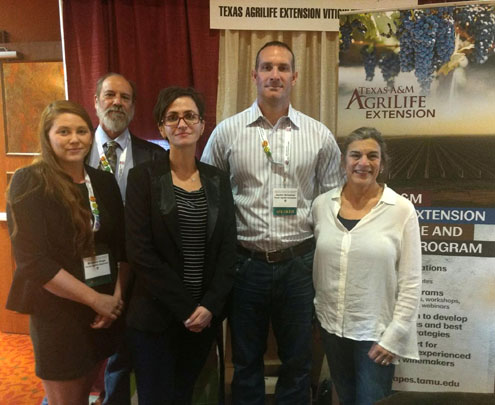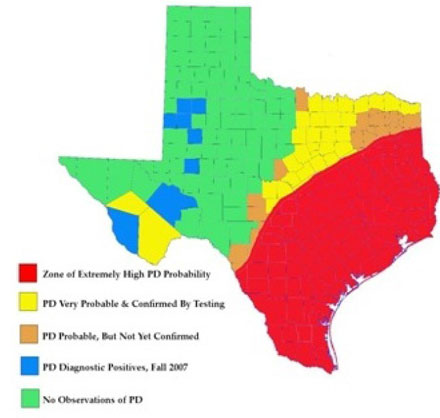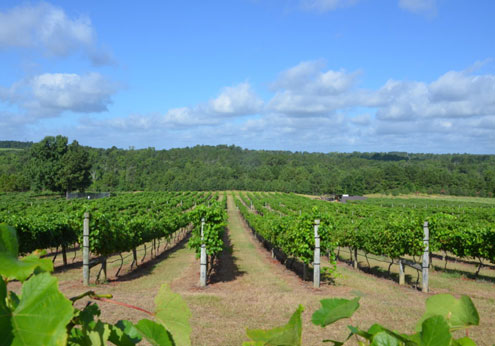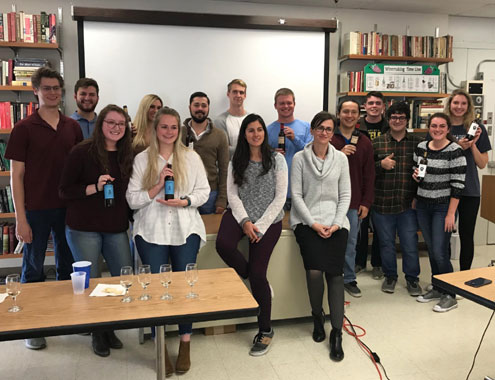Viticulture, enology experts serve
fifth-largest wine industry in U.S.
COLLEGE STATION — To support the growing Texas wine industry, now the fifth-largest in the U.S., the Texas A&M AgriLife Extension Service employs a cadre of viticulture and enology experts providing educational outreach, technical assistance and applied research to prospective and experienced winegrowers throughout the state.
The Texas wine industry has an estimated overall economic impact of $13.1 billion to the state.

“AgriLife Extension maintains eight viticulture and enology positions across the state,” said Dr. Larry Stein, AgriLife Extension horticulturist, Uvalde, and associate head of the Texas A&M University horticulture department. “Our Viticulture and Enology Program offers a range of educational events from informal tailgate meetings to advanced short courses, workshops and webinars. We also recently established an Enology Certificate Program for Texas A&M students.”
For more on the Texas A&M Enology Certificate, go to http://tinyurl.com/EnologyCertificate.
Stein said the team helps vineyard owners and managers with a wide range of challenges, including site selection, rootstock and cultivar choice, vineyard management practices and plant disease, including Pierce’s Disease — the largest threat to the state’s wine industry. They also cooperate and collaborate with the Texas Department of Agriculture and wine industry organizations such as the Texas Wine Grape Growers Association.

One of the most-visited wine regions in the U.S. is the Texas Hill Country, bringing in more than 30 million visitors annually. Brianna Hoge is the AgriLife Extension viticulture program specialist serving that region.
“The Hill Country is generally more favorable than other wine-producing areas of the state, but we still have numerous foliar and fruit pathogens, as well as Pierce’s Disease and cotton root rot that can affect quality and yield,” Hoge said. “We help producers identify these pathogens and recommend what we feel would be the most effective treatment for them.”

Fredericksburg, in the heart of the Texas Hill Country, is home to AgriLife Extension fruit and viticulture specialist Jim Kamas and to Texas A&M AgriLife Extension Viticulture and Fruit Lab program coordinator and laboratory manager Jacy Lewis.
“I’ve been helping the industry identify and address issues affecting their profitability and sustainability for more than 20 years,” Kamas said. “While we’ve made excellent progress in dealing with Pierce’s Disease, there are other viral and fungal diseases that threaten producer viability and profitability. My goal is to help them identify more disease-resistant grape varieties and provide whatever assistance I can to help them remain sustainable.”
Lewis is responsible for maintaining and operating the laboratory, greenhouses and vineyard, and for proposing and managing applied research projects at the lab. Collaborating with other AgriLife Extension viticulturists, she helped complete a trial of grape rootstocks and their performance under various Texas soil and climatic conditions. She also participated in studies relating to the prevention of cotton root rot in grapes, as well as numerous variety trials of Pierce’s Disease-resistant grape varieties.
Along with the Texas Hill Country, North Texas has the state’s highest concentration of wineries. Michael Cook, AgriLife Extension viticulture specialist for that region, provides industry support through workshops, hands-on demonstrations, research-based educational materials and in-person vineyard site visits.
“I also collaborate on applied research trials that provide solutions to real-world challenges, which currently include frost mitigation technology effectiveness, vineyard floor management chemical options, and varietal/rootstock adaptability and performance,” Cook said.
Danny Hillin, recently appointed AgriLife Extension viticulture program specialist for the South Plains region, and viticulture specialist Dr. Pierre Helwi, both based in Lubbock, serve the state’s largest wine-grape producing area, responsible for 80-85 percent of total production. Hillin is primarily involved in educational outreach, while Helwi focuses most of his efforts on applied research.
“The region’s hot, dry climate and sandy soil create a climate that’s conducive to growing high-quality vinifera grapes,” Helwi explained. “We don’t have much disease pressure, but we do have spring frosts, hailstorms and other weather challenges. Currently, I’m researching the use of protective hail netting to see if the shade it casts may impact fruit yield or quality. I’m also researching the use of a mechanical harvester to reduce grape crop load and how that possibly affects yield or quality.”
Fran Pontasch, AgriLife Extension viticulture program specialist for the Gulf Coast, serves a close-knit community of grape growers on smaller farms specializing in Pierce’s Disease-tolerant, hot-climate grape varieties suited to the climate and soil conditions of Southeast Texas.
“Our viticulture programming follows the growing season of the grapevine into dormant-season tasks for the winegrower,” Pontasch said. “And our long-term support strategy involves accumulating data and best vineyard practices of heat- and disease-tolerant varieties throughout the region so we may potentially benefit the worldwide wine industry.”
Serving the industry from the Texas A&M campus in College Station are AgriLife Extension viticulture program specialist Dr. Justin Scheiner and AgriLife Extension enology specialist Dr. Andreea Botezatu.
Scheiner oversees an applied research program focusing on best management practices for areas of Texas affected by Pierce’s Disease.
“That includes projects ranging from cultivar and rootstock testing to frost protection to factors affecting grape and wine quality,” Scheiner said. “I also have a teaching appointment and am on the graduate faculty, so many of these research projects involve grad students. I also help develop educational programs for the Texas wine industry and TAMU students.”
Botezatu serves the Texas winemaking industry through applied research and developing educational opportunities for current and prospective winemakers.
“Enology is a complementary field to viticulture and my work has to do mainly with how the grapes are processed and the chemistry and microbiology affecting the sensory properties of wine,” Botezatu said. “I work with vineyards on aspects of wine such as tannins, pH level and color stability. I’m currently doing applied research in collaboration with two Texas wineries, along with conducting workshops and providing YouTube webinars featuring national and international enology experts (http://tinyurl.com/EnoWeb).”
She also noted there are 26 Texas A&M students currently enrolled for enology certification.
Stein said while the entire team is helping the industry meet existing challenges, their efforts are also focused on the future.
“We are constantly learning from both our successes and failures and sharing that information with others,” Stein said. “Our goal is to support the industry through the newest technologies, best management methods and cutting-edge and forward-reaching research and education. In addition, we are also educating young people interested in viticulture and enology in the hopes they will participate in and contribute to the Texas wine industry in the coming years.”

TEXAS A&M AGRILIFE EXTENSION VITICULTURE/ENOLOGY EXPERTS:
AgriLife Extension Associate Department Head — Horticulture
Dr. Larry Stein, 830-278-9151, larrystein@tamu.edu
AgriLife Extension Viticulture Program Specialists
Gulf Coast — Fran Pontasch, 979-845-5341, fmpontasch@tamu.edu
North Texas — Michael Cook, 940-349-2896, michael.cook@ag.tamu.edu
South Plains — Danny Hillin, 806-723-8416, dannyh@tamu.edu
Hill Country – Brianna Hoge, 830-990-4046, brianna.hoge@ag.tamu.edu
AgriLife Extension Fruit and Viticulture Specialist
Jim Kamas, 830-990-4046, j-kamas@tamu.edu
TAMU AgriLife Extension Viticulture and Fruit Lab Program Coordinator/Manager
Jacy Lewis, 830-990-4046, jacy.lewis@ag.tamu.edu
AgriLife Extension Viticulture Specialists
Dr. Pierre Helwi, 806-746-6101, pierre.helwi@ag.tamu.edu
Dr. Justin Scheiner, 979-845-1870, jscheiner@tamu.edu
AgriLife Extension Enology Specialist
Dr. Andreea Botezatu, 979-845-8563, abotezatu@tamu.edu